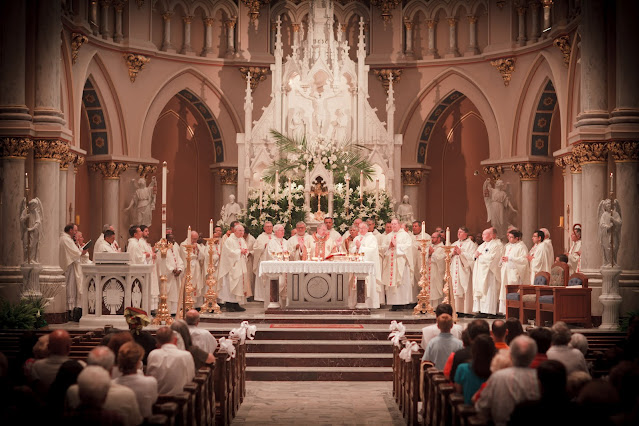When I was a child growing up at home, our family meal was very important and if we all were home together, we had breakfast, lunch and dinner at the table and together and the table was set. It was simpler for breakfast and lunch but a bit more formal for supper. We ate supper as a family each day and together at a set table. Sunday dinner was around noon and more formal.
And for special occasions, we had lace tablecloth, the good china and silverware as well as crystal glasses.
As a young child and well before my First Holy Communion, I made a connection between the lace altar clothes on the various altars in the churches where we attended Mass and the nice Italian lace table clothes my mom had which she had purchased in Italy, these used for special occasions.
Today, altar cloths are very minimalistic and usually do not hang down in any way and lace seems to be eschewed.
In fact, the linens used at Mass in many parishes are not properly cared for and are a dirty wrinkled mess and seldom fit the altar properly.
All of this is how lack of attention to detail, which characterizes the modern Mass, diminishes what the Holy Sacrifice of the Mass is and the necessity to have the right belief to have the right active/actual participation. Active/actual participation begins with the laity showing up for Mass. They won’t show up if it does not appear to be important when they are actually there.
Please note the sloppiness and ugliness of the altar cloth and its placement in this more recent photo:



8 comments:
In regard to Eucharistic Revival:
There are folks who claim that only 30 or so percent of Catholics believe in the Real Presence. Many among said folks employ that questionable statistic to defame Vatican II, as well as the Holy Mass of Pope Saint Paul VI.
That very questionable statistic arrived via a 2019 A.D. Pew Research poll that claimed:
"Just one-third of U.S. Catholics agree with their church that Eucharist is body, blood of Christ."
Interestingly, in 2008 A.D., Father John Neuhaus (requiscat in pace) noted that a survey had claimed that just 33 percent of Catholics believed in the Real Presence.
He noted the manner in which said survey had posed "clumsily worded" questions.
Father Neuhaus, instead, referenced an in-depth study that had concluded: "81 percent say that belief that Jesus is really present in the Eucharist is essential in their understanding of the Catholic faith."
In regard to the 2019 A.D. disputed Pew Research Center survey — that just 33 percent of Catholics believe supposedly in the Real Presence:
Here is an analysis via the Diocese of Springfield-Cape Girardeau that demonstrated the questionable nature of said survey:
https://dioscg.org/pew-survey-needs-clarification-context/
From the analysis in question:
The manufacturing of statistics
"In fact of the 10,971 respondents, only 1,835 “Catholics” actually participated in the 2019 Pew poll—but their responses were used to make assumptions about the beliefs of all 51 million adult American Catholics.
"And it is important to keep in mind that when Pew says “Catholics,” they include non-practicing Catholics who never go to Church; those who quit the Church; and others who were baptized and never catechized.
"The headline says, “Catholics,” but it includes many with no relationship to the Church and many that may not be interested in learning what the Church actually believes."
Pax.
Mark Thomas
In 2019 A.D., Father Thomas Dailey, OSFS, examined the Pew Research Survey in question.
https://media.ascensionpress.com/2019/08/16/how-accurate-is-the-pew-survey-on-the-eucharist/
How Accurate Is the Pew Survey on the Eucharist?
"The headline screamed for attention: “Just one-third of U.S. Catholics agree with their church that Eucharist is body, blood of Christ.” That’s how Pew Research pushed a “fact-tank” article about transubstantiation. The jarring conclusion came at the beginning:
“Just one-third of U.S. Catholics (31%) say they believe that ‘during Catholic Mass, the bread and wine actually become the body and blood of Jesus.’”
Different Survey, Different Results
"In terms of understanding how research reports fit into this search process, we need to appreciate how data is derived. Otherwise, headlines become harbingers of truths that may not hold true.
"One factor to consider here is sample size. The Disciple Maker Index, administered by the Catholic Leadership Institute, has currently surveyed 131,845 Catholics around the country about multiple themes connected with parish life.
"(By contrast, the PEW survey was based on 1,835 Catholics in a total sample population of 10,971.)
"When asked about doctrines of the faith, seventy-two percent of the DMI respondents strongly agreed with the statement “I personally believe the Eucharist really is the body and blood of Jesus Christ.”
"Another nineteen percent agreed with that statement. That’s almost 120,000 Catholics claiming they do agree with what the Church teaches, compared to the 569 respondents highlighted in the PEW headline."
Pax.
Mark Thomas
MT,
I know facing reality is hard for you, but those stats are painfully most likely true. By the way, you keep touting how great the Novus Ordo is, so why do so few Catholics bother to attend? Should it cause the pews to be packed? We did not have empty pews in the US when the TLM held sway.
Father McDonald,
This will cheer you up and provides another example how the younger priests will save Catholicism. I was in Illinois so I stopped for Mass at a parish I used to go to frequently because it is near family and friends there. Last time I went to Mass there a couple of years ago, there was a married priest running the parish in his mid to late 60s. He lacked any ars celebrandi, wore abysmal looking vestments, and the piano pounded while the choir sang trite 1970s and 1980s music.
Fast forward to today. Young pastor, age 35, raised on a hog farm in Illinois, played basketball and obtained a degree in accounting before going to the seminary. He wore beautiful gothic style vestments, the chalice was dressed, the organ was used, and the Kyrie was sung in Greek, and the Sanctus and Agnus Dei sung in Latin. Following Holy Communion we sang the chant, Salve Regina.
What a difference a good man who cares about the Liturgy can do for a parish.
I sent this young priest a note thanking him for the improvements and the message that young priests like him give me hope for the future!
Ok, Mark THomas, squeal all you like but this is from the National Catholic Reporter, the Bible for lefty Catholics like you. Bishop Barron, no less, is disturbed by the findings.You should write to him and tell him he is wrong and you are right.
"A new study about the level of Catholic belief in the real presence of Jesus in the Eucharist showed that a majority of Catholics do not believe that the bread and wine used at Mass become the body and blood of Christ.
The report drew a strong rebuke from Auxiliary Bishop Robert Barron of Los Angeles, who posted Aug. 6 on Twitter: "It's hard to describe how angry I feel after reading what the latest @pewresearch study reveals about understanding of the Eucharist among Catholics. This should be a wake-up call to all of us in the Church."
In a video that accompanied the post, Bishop Barron's anger is not directed at Pew, but inward. "I'm blaming myself, bishops, priests and anybody" responsible for transmitting the faith, he said. "We're all guilty."
He added, "It's been a massive failure of the church carrying on its own tradition."
The Pew study, issued Aug. 5, showed that 69% of all self-identified Catholics said they believed the bread and wine used at Mass are not Jesus, but instead "symbols of the body and blood of Jesus Christ." The other 31% believed in the real presence of Jesus in the Eucharist, known as transubstantiation."
All signs have led me to reject the notion that just 30 or so percent of Catholics believe in the Real Presence.
That percentage does not correspond to the countless holy Catholics I know, and have encountered, at Mass, as well as outside Mass.
I have encountered too much reverence during Holy Communion to consider that just 30 or so percent of Catholics believe in the Real Presence.
Beyond that, as the Diocese of Springfield-Cape Girardeau noted,"only 1,835 'Catholics' actually participated in the 2019 Pew poll — but their responses were used to make assumptions about the beliefs of all 51 million adult American Catholics."
Conversely, The Disciple Maker Index, administered by the Catholic Leadership Institute, surveyed 131,845 Catholics around the country...
72 percent of the DMI respondents strongly agreed with the statement “I personally believe the Eucharist really is the body and blood of Jesus Christ.”
That is all that I need to know about that.
=======================================================================
Only 1,835 'Catholics' participated in the 2019 Pew poll.
Unbelievable.
Pax.
Mark Thomas
— Pope Benedict XVI, 2012 A.D: The Holy Spirit is the driving force behind Vatican II.
Just reading this and can’t tell from the posts if the samples were taken from a sample chosen and controlled to represent the Catholic population of the USA, regular Mass participants, readers of the NYT, etc. One would expect that to have an impact on the results and to be informative to Church leadership.
Father McDonald,
This is an excellent article on the Arlington Diocese implementation of Traditiones Crudelis (Custodes):
https://www.crisismagazine.com/2022/when-bishops-put-obedience-above-charity
Here is the opening paragraph:
"Fifteen years ago, Bishop Michael Burbidge, then heading the Diocese of Raleigh, instituted one of the best plans for implementing Summorum Pontificum. Two months ago, he announced one of the worst policies for implementing Traditionis Custodes in his current Diocese of Arlington. Public understanding of this policy has been confused by half-truths from both the diocese and its critics. The reality is in some ways better and in some ways more disturbing than it seems."
Post a Comment